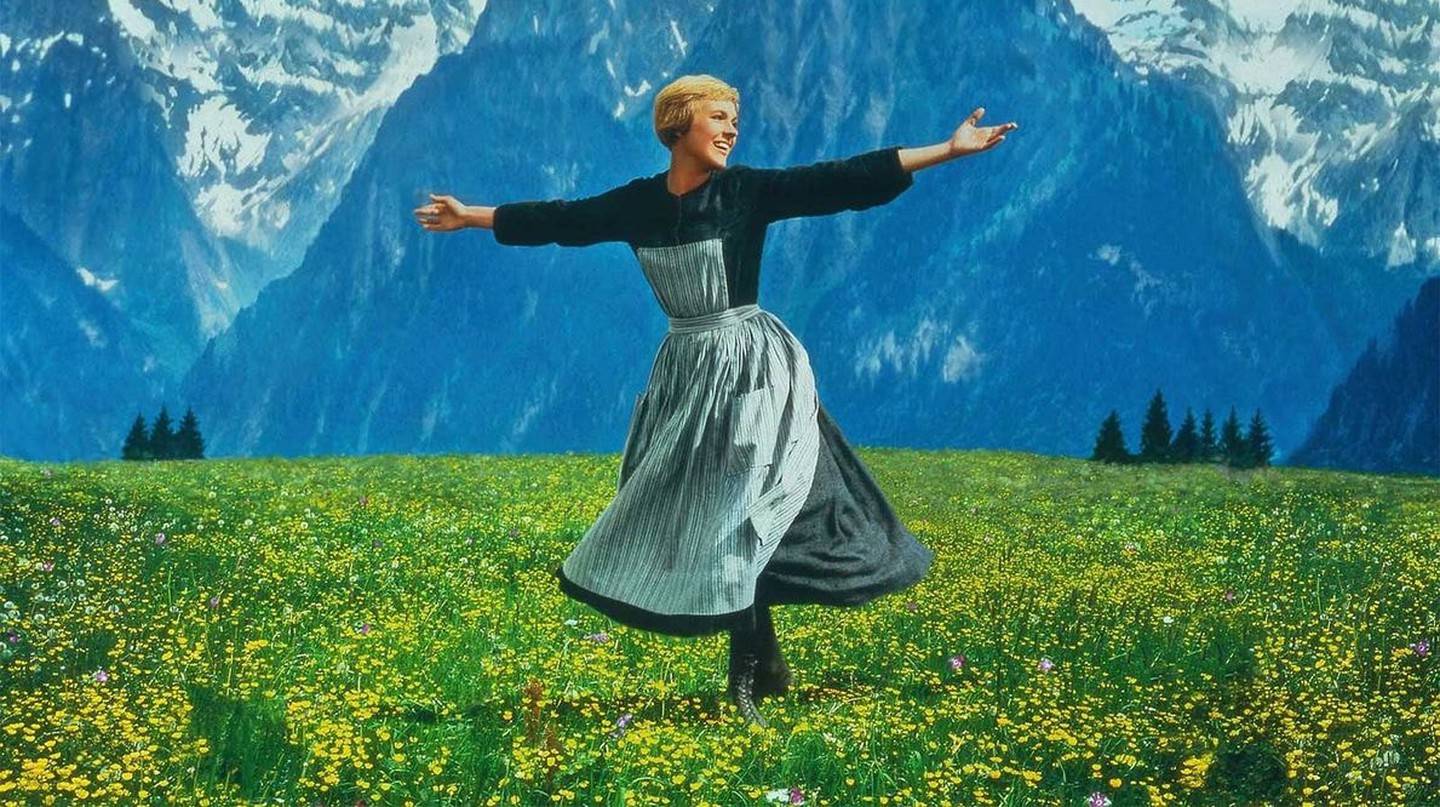Hitler tried to take over the world, he failed, and then his country got colonized by a shitty children’s movie.
Introduction
I actually wasn’t sure what I wanted to write about today. Then I saw a post on Facebook. TLDR: a conservative complained that film critics don’t know what they’re talking about, and he cited the 1965 film The Sound of Music as an example. Critics panned the movie as pointless sentimentality, but it became an immediate hit and one of the highest-grossing films of all time. Here’s the accompanying quote from the Wikipedia page:
Bosley Crowther, in The New York Times, criticized the film’s “romantic nonsense and sentiment”, the children’s “artificial roles”, and Robert Wise’s “cosy-cum-corny” direction. Judith Crist, in a biting review in the New York Herald Tribune, dismissed the movie as “icky sticky” and designed for “the five to seven set and their mommies”. In her review for McCall’s magazine, Pauline Kael called the film “the sugar-coated lie people seem to want to eat”, and that audiences have “turned into emotional and aesthetic imbeciles when we hear ourselves humming the sickly, goody-goody songs.
The following paragraph on Wikipedia had this line:
The film’s Nazi theme was especially unpopular in Germany, where the Munich branch manager for 20th Century Fox approved the unauthorized cutting of the entire third act of the film following the wedding sequence—the scenes showing Salzburg following the Anschluss.
I was about to keep scrolling and go about my day, but now I was hooked. Apparently, The Sound of Music was a commercial failure in both Austria (where the movie’s events take place in the 1930s) and Germany. But why? What’s wrong with the anti-Nazi sentimentality in the movie? Why would a German producer be so angry he would cut out the movie’s ending scenes, knowing full well that he would be caught and fired for it? Well, here’s what I found out, and how I got there.
Origins
First, some background. The Sound of Music is very, very loosely based on the real-life Trapp family, who did escape Nazism (to Fascist Italy, not Switzerland like in the movie, take some guesses on why that change was made). Julie Andrews stars as Maria Franziska. Julie was scouted for that role while she was still working for Mary Poppins, which is unsurprising because The Sound of Music and Mary Poppins are basically the same movie. A charismatic nanny takes charge of some children with an over-demanding father, and she teaches them to sing, dance, and have quirky adventures.
Remember that Disney movie Frozen a few years ago? Oh my God, I just looked it up. Frozen was made in 2013… Anyway. Frozen was a guaranteed box office success. It’s a cutesy adventure set in a generic European village filled with generic European people who dress funny and love to sing. The Sound of Music is a cutesy adventure set in a generic European village filled with generic European people who dress funny and love to sing. See my point? It’s a little hypocritical for conservatives to complain about contemporary movies and pine for the “good old days” when in fact, movies from back then had mostly the same flaws as they do now.
Conservatives gripe about Disney movies, including Frozen, because they push LGBT issues and other liberal ideas. Okay, fine. That’s a valid thing to disagree with. I won’t even say that these conservatives are entirely overreacting. But let’s look at The Sound of Music and the political ideology it was peddling.
Context
As a typical American kid, I watched The Sound of Music and enjoyed it, but the politics were lost on me. The Cold War was already over. What was happening in 1965 when Julie sang pseudo-Austrian folk songs on the silver screen?
First, the events leading up to it. In 1950, things were going badly for Western civilization. Stalin’s Soviet Union was more powerful than ever, and Maoist China had emerged as another threat to Europe’s global supremacy. It was becoming very obvious to everyone that the war on the Untermensch could not be won without Germany. In August, Chancellor Konrad Adenauer secretly met with Nazi war criminal Franz Halder and former officers in Hitler’s Wehrmacht to write the Himmerod Memorandum. Under the provisions of the Himmerod Memorandum, all the remaining war criminals still imprisoned were to be released, and West Germany would emerge as a new Nazi Democratic force. Five years later in 1950, West Germany joined NATO.
Gen. Dwight D. Eisenhower took a central role in the conspiracy. In January 1951, Eisenhower praised Hitler’s soldiers.
Although they were defeated in World War II, German soldiers and officers did not lose their individual honor
-Dwight D. Eisenhower
Note that as the supreme commander of Europe, Eisenhower was well aware that Wehrmacht soldiers had committed a huge number of atrocities. They had killed almost 30 million people and raped at least 10 million women and girls. But he deliberately lied to protect his new Nazi allies.
Meanwhile, Halder joined the US Army Historical Division to supervise a special department of Nazi officers to write the official volumes about the Eastern Front of WWII. Of course, the Nazis depicted themselves as brave knights heroically defending Europe and depicted the Soviets as Untermensch rapist animals. Also, predictably, Nazi writers for the US Army wildly exaggerated their battlefield successes, and blamed their defeats on the weather. In this same period, American and British military intelligence analysts were forbidden from publishing anything overtly negative about Nazi Germany. These lies are collectively known as the Myth of the Clean Wehrmacht. The chief architects of the Holocaust like Heinz Guderian are openly celebrated as heroes up to the present day, and most Americans don’t know about the German war crimes in the Soviet Union.
With all that in mind, the angry producer in Munich makes a little more sense, doesn’t he? The Nazis weren’t some cringe minority, they were wildly popular. Many people in West Germany loved Nazis. Then some stupid American movie came along that depicted Nazis as the bad guys. That producer was so enraged he was willing to get fired over it.
Controversy
But that’s still not quite the whole picture. The Nazis were back in power, and the USA had picked up the towel where Hitler dropped it. Maybe his dream of exterminating the Untermensch would, despite all the setbacks, come true after all. However, there were still problems. There was still quite a bit of anti-German sentiment in the American population, a natural consequence of having two back-to-back wars with Germany. Then in 1960, things took a turn for the worse. American journalist William Shirer published his incendiary book The Rise and Fall of the Third Reich. It sold more than 2 million copies and reached even more people in subsequent serialized editions. Shirer had the audacity to openly say that the Nazis were bad, but he went even further and said posited that Germans have a cultural tendency for obedience – so Hitler was a logical conclusion of their society, not a wild accident.
Let’s also remember that American culture as a whole was trending toward social liberalism in the late 1950s and early ’60s. Yet our leaders were openly worshipping the worst fascist regime that ever existed, and allied with their successor state, West Germany. That’s a little ironic, and maybe caused some conflicts of interest.
Then, The Sound of Music! About that. Yes, the movie has Nazis in it, and they are bad. Sort of. I mean, they scowl a lot and we’re supposed to know that they’re bad. Now granted, we’re not actually told why they’re bad and they don’t actually do anything particularly bad, but oh well. The movie’s Nazis are so generic you could swap them out with literally any other villain, and the plot wouldn’t change at all. What if Austria was taken over by Oscorp, the Umbrella Corporation, or space pirates, would anything happen differently? Nope. The Nazis would just wear different hats and say “arrrrr!” a lot. While The Sound of Music is ostensibly an anti-Nazi movie, there’s no danger of confusing it with Come and See.
The Neutering of Hitler
Not only are the movie pirates Nazis turned into a laughable cliche, Austria as a whole is turned into a shallow aesthetic. Like the cutesy village in Frozen, except Austria is a real place. How the mighty have fallen! In one of the most iconic scenes of the movie, Austrian people defiantly sing their national anthem, while scowling Nazis stare at them angrily (but don’t do anything). It’s a wonderful scene, but there’s a problem. It’s not Austria’s national anthem at all, it’s a made-up song from Broadway. Think about how wildly insulting that is.
As I mentioned earlier, The Sound of Music was a flop in Austria. But that makes no difference because it wasn’t for them. The Sound of Music was a movie for Americans, and it succeeded. It turned Austria into a cutesy joke. Once a country is a joke, it’s no longer a threat and there’s no need to hate it anymore. Austria is mostly culturally equivalent to Germany, so that feeling applies to them as well.
Turning Nazis into generic villains was one of the biggest propaganda victories in human history. I found this article by a guy who says that he was inspired by The Sound of Music to attend a protest in 1968 against… the Soviet Union. Imagine that logic:
-The Nazis were vague authoritarian bad guys.
-All of America’s “adversaries” are authoritarian.
-Therefore, all of our adversaries are bad.
The Sound of Music literally rotted people’s brains. I struggle to imagine how it is even possible to be this stupid.
Ian Kummer

Support my work by making a contribution through Boosty
All text in Reading Junkie posts are free to share or republish without permission, and I highly encourage my fellow bloggers to do so. Please be courteous and link back to the original.
I now have a new YouTube channel that I will use to upload videos from my travels around Russia. Expect new content there soon. Please give me a follow here.
Also feel free to connect with me on Quora (I sometimes share unique articles there).




Well, yes, remember Die Hard, the first one? The villain is kinda German. Also, European villains are smart, wear nice suits, Russkie villains are dumb.
Maria kondorskaya, Alan Rickman is still best villain, all politics aside
Ian Kummer, yess